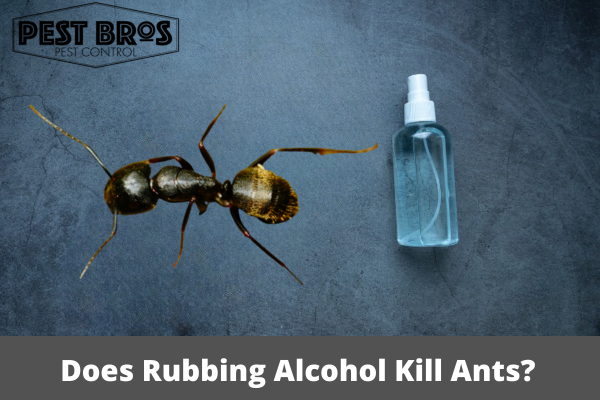

Does Rubbing Alcohol Kill Ants?
When dealing with an ant infestation, homeowners frequently look for quick and easy remedies. The use of rubbing alcohol is one popular suggestion that has gained traction. However, before relying on this common household item, it is necessary to determine whether rubbing alcohol genuinely can eliminate these little pests. In this blog post, we’ll investigate the use of rubbing alcohol as an ant killer, looking at its possible benefits, limitations, and alternative ant-control tactics. So, can alcohol kill ants? Let’s find out.


The Myth of Rubbing Alcohol
Rubbing alcohol, or isopropyl alcohol, is a multipurpose material used to disinfect wounds, clean surfaces, and remove stains. Given its propensity to eradicate germs and bacteria, it’s reasonable to question if rubbing alcohol may be used to combat ants.
Contrary to popular opinion, rubbing alcohol alone is not reliable for ant extermination. While antibacterial, it is not directed specifically at ants or their colonies. Spraying individual ants with rubbing alcohol may temporarily immobilize or kill them, but it does not address the underlying problem of an infestation.
Limitations of Rubbing Alcohol
There are certain drawbacks to using rubbing alcohol as an ant killer. Because rubbing alcohol evaporates quickly, its usefulness is limited. It has difficulty penetrating intricate ant routes and nests, frequently leaving colonies intact. Furthermore, rubbing alcohol is largely a contact killer, affecting only ants who touch it directly. This is difficult because ants prefer to live in difficult-to-reach places. While spraying rubbing alcohol may kill a few visible ants, it does not address the underlying issue of the ant colony.
Alternative Strategies for Effective Ant Control
While rubbing alcohol may not be the best approach for ant control, there are other methods that homeowners can use to efficiently combat ant infestations:
Identification and Prevention
It is critical to identify the ant species to execute targeted interventions. To inhibit ant colonies from forming themselves, seal entry points, eliminate food and water sources, and keep the dwelling clean.
Natural Deterrents
Certain compounds, such as cinnamon, vinegar, or citrus peels, repel ants. These compounds can be sprinkled near ant trails or entry points to deter ants from entering your property.
Get More Information: How Do You Control Scorpions at Home?
Baiting and Traps
Ant baits with slow-acting pesticides are extremely efficient. Ants transport the bait back to the colony, allowing the poison to reach the queen and effectively wipe off the colony.
Professional Pest Control
It is best to contact professional pest control services in extreme infestations or when DIY approaches fail. They have the knowledge and resources to properly identify, locate, and remove ant colonies.
Final Thoughts
When dealing with ant infestations, you need dependable and skilled staff.
This is where The Pest Bros. step in! We are your trusted pest control professionals, committed to offering efficient solutions adapted to your requirements.
Don’t be misled by the rubbing alcohol myth—trust the pros to manage your ant problems accurately and skillfully. Because our team understands the behavior and habits of various ant species, we can execute specialized techniques for long-term results.
We employ innovative techniques, eco-friendly chemicals, and years of experience to ensure the total eradication of ant colonies. We go beyond eradicating visible ants by tackling the infestation’s fundamental cause—the queen and her colony. Call us now to experience the difference!




